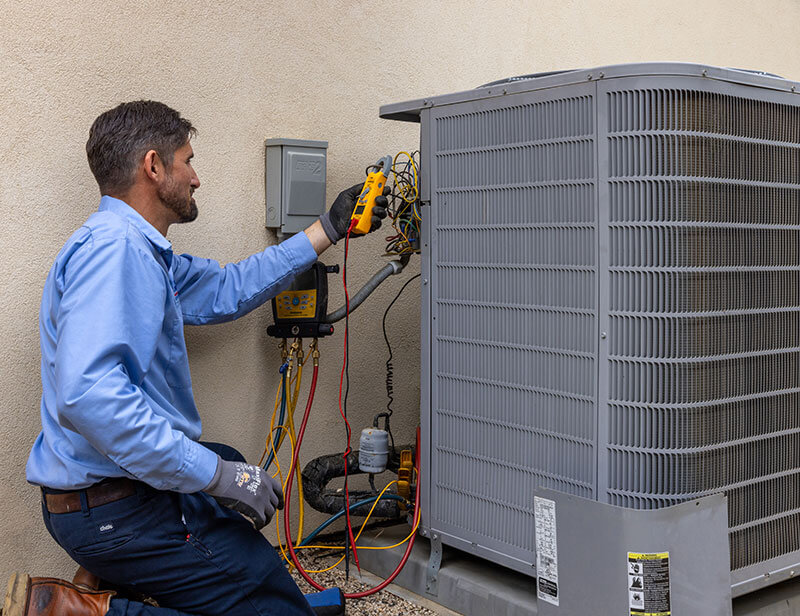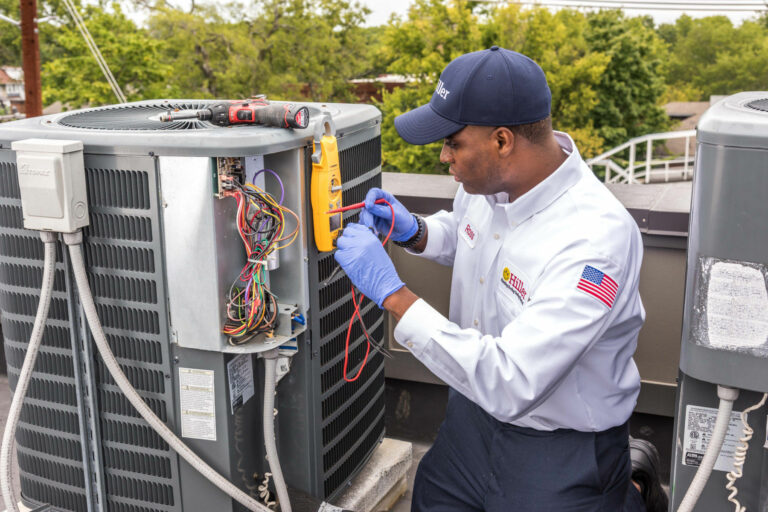DIY or Pro? heat pump service: What You Need to Know
DIY or Pro? heat pump service: What You Need to Know
Blog Article
Picking In Between a Warm Pump and Furnace: Secret Considerations for Your HVAC Requirements
When assessing home heating choices for cooling and heating needs, the decision between a warmth pump and a heater can be complicated. Each system provides unique advantages customized to certain environments and energy effectiveness goals. Understanding these distinctions is crucial for making an enlightened choice. Trick factors such as installation prices and environmental impact better make complex the choice procedure. Which alternative really straightens with one's convenience and sustainability choices? The complying with sections will certainly check out these factors to consider in information.
Understanding Warmth Pumps: How They Work and Their Benefits
While several property owners consider different home heating options, comprehending exactly how heat pumps function and their benefits can substantially influence their decision. Warm pumps operate by transferring warmth instead of producing it. In the winter months, they extract warm from the outdoors air or ground and transfer it inside your home, while in the summer season, they reverse this procedure, cooling down the home by eliminating heat outside. This double functionality makes them flexible for year-round climate control.One of the primary benefits of heatpump is their energy performance. They utilize substantially less electrical energy compared to typical furnace, potentially leading to lower utility costs (heat pump installation ooltewah tn). Furthermore, heatpump have a smaller carbon impact, making them an environmentally pleasant choice. They also require much less upkeep than traditional systems, contributing to long-lasting cost savings. In general, comprehending the mechanics and advantages of heat pumps can aid property owners make informed decisions regarding their home heating and cooling down demands
Discovering Heaters: Kinds, Procedure, and Benefits
Furnaces can be found in numerous kinds, consisting of gas, electrical, and oil models, each with unique functional systems. Recognizing these differences is vital, as they affect efficiency and heating efficiency. Furthermore, heating systems offer many benefits, such as consistent heat output and integrity in chillier climates.
Kinds of Furnaces
Furnace can differ considerably in layout and operation, with heaters being a prominent choice among homeowners. There are a number of kinds of furnaces, each using different fuel resources and modern technologies. Gas furnaces prevail, leveraging natural gas to generate warm efficiently. Electric heaters, on the other hand, make use of electric resistance to generate warmth, usually favored for their simple installation. Oil heaters, while much less typical, are effective in areas with minimal gas gain access to (furnace replacement). Furthermore, condensing heaters make best use of energy performance by reusing and capturing exhaust gases. Each type runs through a system of heat exchangers and ductwork to distribute cozy air throughout a home. Understanding the distinctions in between these furnace types is vital for educated HVAC choices
Benefits of Heating systems
For homeowners seeking reputable heat during chilly months, the advantages of heaters are considerable. Heaters provide regular heating, making certain also temperatures throughout the home. They are especially reliable in severe cold, typically surpassing heatpump in freezing conditions. Numerous kinds, consisting of gas, electric, and oil heaters, use flexibility to meet varied needs and preferences.Furnaces likewise often tend to have reduced first installation prices compared to heat pumps, making them a much more obtainable alternative for several. Their durable layout adds to a longer lifespan, with many units lasting over 15 years with appropriate maintenance. Furthermore, modern furnaces are usually furnished with advanced modern technology for improved effectiveness, which can lead to decreased power costs. Overall, heating systems remain a trustworthy selection for effective home heating.

Energy Effectiveness: Comparing Warmth Pumps and Furnaces
When contrasting power effectiveness between warm pumps and furnaces, the Seasonal Energy Efficiency Proportion (SEER) plays a crucial duty in establishing efficiency. Additionally, an operational expense evaluation reveals the lasting economic ramifications of each system. Recognizing these variables can direct house owners in making educated decisions concerning their home heating options.
Seasonal Energy Effectiveness Proportion
Energy efficiency plays an essential function in the decision-making process between heatpump and heating systems, especially when taking into consideration the Seasonal Power Effectiveness Ratio (SEER) This statistics actions the cooling performance of heatpump over an entire air conditioning period, supplying a standardized means to assess efficiency. Higher SEER ratings show higher energy performance, equating to lower power intake and decreased utility costs. In contrast, heaters are normally assessed using the Yearly Gas Application Efficiency (AFUE) ranking, which reflects heating performance. When comparing these two systems, home owners ought to focus on SEER ratings for heatpump, as they directly effect total energy savings and environmental sustainability. An extensive understanding of SEER can significantly influence the long-term satisfaction and cost-effectiveness of the selected HVAC option.
Functional Price Evaluation
Understanding the operational costs associated with heatpump and heaters is crucial for property owners reviewing their alternatives. Heat pumps typically use higher power effectiveness, converting electrical energy into warmth with marginal waste. This results in lower month-to-month energy costs, especially in modest climates. Alternatively, standard heating systems, especially gas designs, may have reduced upfront costs however can sustain higher operational costs with time due to fuel rates and performance ratings.Moreover, heat pumps can function as both heating and cooling systems, potentially lowering the need for different cooling and heating devices. While preliminary investments for heatpump might be higher, their long-lasting savings in power effectiveness can make them a much more cost-effective option for lots of homes. Cautious evaluation of neighborhood power rates is vital to identify the finest choice.
Installation Costs: What to Expect for each and every Heating Unit
Installment costs for furnace can differ significantly in between heatpump and heating systems, influencing house owners' choices. Warm pumps usually have greater in advance setup costs, usually ranging from $3,500 to $8,000, depending on the unit size and complexity of installation. This includes the outdoor system, interior handling system, and required ductwork modifications. Conversely, heating systems tend to have reduced initial prices, averaging between $2,500 and $6,000, which can be appealing for budget-conscious home owners. Setup costs can increase if extensive ductwork is required.Moreover, the selection of gas type for furnaces-- natural gas, gas, or electrical-- can additionally affect installment prices. more While heatpump use power effectiveness, their preliminary financial investment might prevent some purchasers. Ultimately, assessing setup costs alongside long-term cost savings and performance will certainly assist house owners in making informed decisions concerning their home heating systems.
Environment Factors To Consider: Which System Does Better in Your Location
Exactly how do climate problems influence the performance of heating unit? The efficiency of heatpump and heaters can vary significantly relying on the local environment. In modest climates, warm pumps succeed by effectively moving warmth from the outdoors air, making them an energy-saving option. Nevertheless, their efficiency lessens in extremely chilly temperature levels, where they might have a hard time to extract enough warm. On the other hand, heaters, particularly gas versions, give reliable and regular warmth despite outside problems, making them better in chillier regions.In areas that experience milder winter seasons, warm pumps can run effectively year-round, supplying both cooling and heating. On the other hand, areas with extreme winter seasons often benefit from the robustness of heaters. Eventually, understanding the regional climate is vital when choosing in between a warmth pump and a furnace, as it straight influences their functional performance and total efficiency.
Upkeep Demands: Long-Term Look After Heat Pumps vs. Furnaces
While both heatpump and heating systems need normal maintenance to assure peak efficiency, their details requirements and care regimens vary substantially. Heaters usually need much less regular attention, with annual evaluations sufficing to look for gas leakages, tidy filters, and evaluate overall functionality. Their easier layout frequently enables uncomplicated repairs.In contrast, warm pumps demand semiannual maintenance due to their twin duty in cooling and heating. This consists of cleansing coils, examining cooling agent degrees, and guaranteeing that both the outdoor and interior units work at their ideal. Furthermore, heat pump upkeep often involves more complex parts, making expert servicing essential.Neglecting upkeep can bring about decreased performance and boosted energy expenses for both systems. Ultimately, property owners need to consider these lasting care demands when picking between a warmth pump and a furnace, as proactive upkeep can extend click for info the life expectancy and efficiency of either system significantly.
Ecological Impact: Choosing a Lasting Heating Alternative
The environmental influence of heating unit is a critical analysis for home owners looking for sustainable options. Warmth pumps are usually extra energy-efficient than conventional heaters, as they transfer warm rather than create it, considerably minimizing carbon emissions. By utilizing eco-friendly energy resources, such as air-source or geothermal warm pumps, house owners can better minimize their eco-friendly footprint.On the various other hand, all-natural gas heating systems discharge greenhouse gases and add to air pollution, though they commonly provide higher warmth result. However, developments in technology have led to the advancement of high-efficiency heating systems visit our website that decrease emissions.Ultimately, picking a heater involves evaluating efficiency against environmental influence. Property owners are motivated to reflect on neighborhood power sources and motivations for sustainable systems, guaranteeing an option that lines up with both individual convenience and environmental obligation. The decision influences not only immediate comfort yet also lasting sustainability and ecological wellness.
Often Asked Inquiries
Exactly How Lengthy Do Warmth Pumps and Furnaces Generally Last?
The lifespan of heatpump commonly varies from 15 to twenty years, while heating systems can last between 15 to 30 years. Regular upkeep significantly influences their longevity and performance in providing home heating remedies.
Can I Use a Warm Pump in Extremely Cold Climates?
Heatpump can run in exceptionally cool environments, however their effectiveness decreases as temperatures decline. In such problems, supplemental heating resources might be essential to keep comfortable indoor temperature levels and assure peak efficiency.

What Is the Sound Level of Heat Pumps Versus Furnaces?
The sound levels of heatpump and heating systems vary considerably. Normally, heatpump run even more silently than conventional heaters, making them preferable for those conscious appear, while furnaces might generate louder functional sounds throughout home heating cycles.
Are Warm Pumps Suitable for Both Home Heating and Air conditioning?
Heatpump are undoubtedly appropriate for both home heating and cooling (heat pump service). They work by transferring warmth, giving reliable temperature level control year-round, making them a functional option for house owners looking for an all-in-one a/c option
What Dimension Furnace Do I Need for My Home?
Establishing the ideal size heater for a home requires evaluating factors such as square video footage, insulation quality, neighborhood climate, and the home's design. Consulting a professional can assure an accurate evaluation and optimal convenience. Warm pumps commonly offer higher energy performance, transforming electrical energy right into heat with very little waste. In moderate climates, warmth pumps excel by successfully transferring heat from the outside air, making them an energy-saving option. On the other hand, heaters, specifically gas designs, supply consistent and reputable heat no matter of outdoor problems, making them more suitable in colder regions.In areas that experience milder winters, heat pumps can run properly year-round, providing both heating and air conditioning. Warm pumps are usually extra energy-efficient than conventional furnaces, as they move heat rather than produce it, significantly decreasing carbon discharges. By making use of eco-friendly energy resources, such as air-source or geothermal warmth pumps, homeowners can further decrease their environmental footprint.On the various other hand, all-natural gas heating systems discharge greenhouse gases and add to air pollution, though they commonly provide higher warm outcome.
Report this page